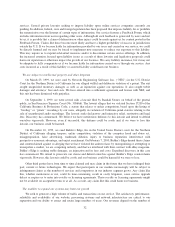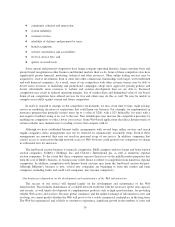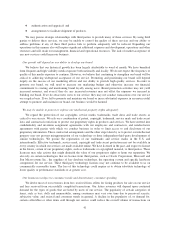eBay 1999 Annual Report Download - page 36
Download and view the complete annual report
Please find page 36 of the 1999 eBay annual report below. You can navigate through the pages in the report by either clicking on the pages listed below, or by using the keyword search tool below to find specific information within the annual report.A large number of transactions occur on our website. As a result, we believe that government regulators
have received a substantial number of consumer complaints about us which, while small as a percentage of our
total transactions, are large in aggregate numbers. As a result, we have from time to time been contacted by
various federal, state and local regulatory agencies and been told that they have questions with respect to the
adequacy of the steps we take to protect our users from fraud. For example, the City of New York— Department
of Consumer Affairs received complaints from users about transactions on our website. In investigating these
complaints, the Department of Consumer Affairs requested information about us and these transactions. We have
provided the requested information. We are likely to receive additional inquiries from regulatory agencies in the
future, which may lead to action against us. We have responded to all inquiries from regulatory agencies by
describing our current and planned antifraud efforts. If one or more of these agencies is not satisfied with our
response to current or future inquiries, the resultant investigations and potential fines or other penalties could
harm our business.
We have recently provided information to the antitrust division of the Department of Justice in connection
with an inquiry with an inquiry into our conduct with respect to ‘‘auction aggregators’’ including our licensing
program and our lawsuit against Bidder’s Edge. Should the division decide to take action against us, we would
likely be harmed by negative publicity, the costs of the action, possible private antitrust lawsuits, the diversion
of management time and effort and penalties we might suffer if we ultimately were not to prevail.
Some of our businesses are subject to regulation and others may be in the future
Both B&B and Kruse are subject to regulation in some jurisdictions governing the manner in which live
auctions are conducted. Both are required to obtain licensure in these jurisdictions with respect to their business
or to permit the sale of categories of items (e.g. wine, automobiles, real estate). These licenses generally must be
renewed regularly and are subject to revocation for violation of law, violation of the regulations governing
auctions in general or the sale of the particular item and other events. If either company was unable to renew a
license or had a license revoked, its business would be harmed. In addition, changes to the regulations or the
licensure requirements could increase the complexity and the cost of doing auctions, thereby harming us.
As our activities and the types of goods listed on our site expand, state regulatory agencies may claim that
we are subject to licensure in their jurisdiction. These claims could result in costly litigation or could require us
to change our manner of doing business in ways that increase our costs or reduce our revenues or force us to
prohibit listings of certain items. We could also be subject to fines or other penalties. Any of these outcomes
could harm us.
Billpoint, our Internet payment company, is subject to unique risks
Billpoint is subject to unique risks as a provider of Internet payment solutions. Businesses that handle
consumers’ funds are subject to numerous regulations, including those related to banking, credit cards, escrow,
fair credit reporting and others. Billpoint is a new business with a relatively novel approach to facilitating
payments. It is not yet known how regulatory agencies will treat Billpoint. The cost and complexity of Billpoint’s
business may increase if certain regulations are deemed to apply to its business. In addition to the need to comply
with these regulations, Billpoint’s business is also subject to risks of fraud, the need to grow systems and
processes rapidly if its product is well received, a high level of competition, including competitors who are
currently not charging for their product offerings, and the need to coordinate systems and policies among itself,
us and Wells Fargo Bank, which will be the provider of payment services.
We are subject to risks associated with information disseminated through our service
The law relating to the liability of online services companies for information carried on or disseminated
through their services is currently unsettled. Claims could be made against online services companies under both
United States and foreign law for defamation, libel, invasion of privacy, negligence, copyright or trademark
infringement, or other theories based on the nature and content of the materials disseminated through their
31
























